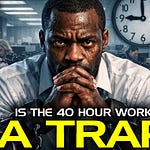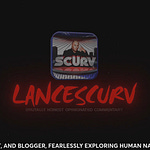A HOUSE DIVIDED BY DESIGN
Why is it that when a native African walks into a room full of Black Americans or Black Brits, the air sometimes gets tight, like judgment is about to fall? Why is there a look—subtle, smug, or even scornful—that cuts across the space as if they don’t belong? Why do many of us, born and raised in the West, feel this quiet, unspoken superiority over our African brothers and sisters? The answer doesn’t live in the streets of Accra or the marketplaces of Lagos—it lives in the poisoned minds we inherited.
Black Americans, and to a large extent Black people across the diaspora—especially in the UK—have been systematically programmed to despise their roots. We were told Africa was nothing but mud huts, wild animals, poverty, and starvation. We were fed lies from textbooks, television screens, missionaries, media, and most painfully, from those who looked like us but had already bought into the deception. Our self-worth was ripped from its divine source and handed back to us covered in European approval stamps.
We didn’t just lose our language and culture—we lost our memory. And when you forget who you are, you’ll despise those who remind you.
TAUGHT TO HATE OUR REFLECTION
From the very beginning of our miseducation, we were taught that Africa was a mistake of history. That Africans sold us, abandoned us, and lived like animals before the white man came with "civilization." We were never told that Africa taught the world civilization—mathematics, science, medicine, law, and spiritual harmony were all born on African soil.
But when your enemy is the one telling your story, they’ll always make themselves the hero and you the failure. And when you grow up hearing that your story starts on a slave ship, everything that came before it feels like fiction. This is why Black Americans and Black Brits sometimes treat native Africans with scorn—we were trained to reject our origin.
CLOSER TO THE COLONIZER, FURTHER FROM THE TRUTH
Let’s be real—some of us feel superior simply because we live in the West. Because we have a passport stamped "USA" or "UK," we act like we’re better. We walk into African spaces with arrogance, not realizing we’re standing on stolen knowledge.
What makes it worse is that we’ve spent generations living under the foot of the colonizer—so close to him that we started wanting to be him. Some of us bleach our skin, fry our hair, get nose jobs and body sculpting surgeries—all to erase the African features the mirror won’t let us ignore.
We don’t hate Africa—we hate the part of ourselves that reminds us we were taken.
THE CONDITIONING IS DEEP
We laugh at African names because they sound "funny" to Western ears.
We mock African accents while imitating British or American ones with pride.
We assume an African who is poor is less intelligent, less civilized, less "relevant."
We ridicule traditional African spirituality while embracing European religions that were forced on us.
What is that, really? That’s not cultural preference. That’s brainwashing.
The colonizer did such a thorough job that we now act as gatekeepers of white supremacy against each other. The minute we see someone who still speaks their native language, wears their cultural clothing, or walks with African pride, we get triggered. Because deep down, we know we’ve lost something.
THE AFRICAN IS THE SYMBOL OF OUR WOUND
When a Black American meets a native African, the interaction is not just social—it’s spiritual. The African represents everything we’ve been disconnected from. And instead of healing the wound, some of us try to bury it deeper by mocking or belittling what we don’t understand.
Many of us react with superiority because we feel shame. But that shame doesn’t belong to us—it was planted.
THE MYTH OF PROGRESS
Yes, we have skyscrapers. Yes, we have jobs, fast food, education, and Hollywood. But if we were truly free, truly healed, we wouldn’t need to look down on anyone to feel better about ourselves.
What we call "progress" is often just proximity to whiteness. But progress isn’t about where you live—it's about who you are.
There are Africans living in huts with more dignity than some of us in mansions. Because dignity comes from identity, not income.
WHO BENEFITS FROM OUR DIVISION?
Let’s never forget—this division is not accidental. The colonizer wants the African and the diasporan Black to remain disconnected. Because he knows that if we unite, it’s over. Economically, spiritually, and politically, the entire global balance would shift.
So he keeps us distracted:
Black Americans laughing at African traditions.
Africans ridiculing Black American pain.
Brits acting as if colonialism was just a chapter in a history book and not an ongoing system.
We are acting out roles in a script we didn’t write.
HEALING MEANS LOOKING BACKWARD AND FORWARD
We need to unlearn the lies. To see our African brothers and sisters not as competitors or backward reminders of a past we were told to be ashamed of—but as the bloodline we’ve been starving for.
Africa is not a continent to be pitied—it is a mother to be reclaimed.
To our African family: forgive us. We are not whole. We are broken people taught to hate our own skin. We are trying to find our way back home, and sometimes, that journey is messy. But we see you. We honor you. And many of us are waking up.
To my fellow Black Americans and Black Brits: look in the mirror. The self-hate stops with us. The superiority complex is a scar, not a crown. Let’s stop turning our backs on the very people who hold the keys to our healing.
IT’S TIME TO RETURN HOME—SPIRITUALLY
The power we’ve been searching for is not in America. It’s not in London. It’s not in the illusion of whiteness or the chase for validation from people who will never love us. It’s in our reconnection to our African brothers and sisters. In rebuilding the bridges they tried to burn. In seeing through the lies and choosing unity over ego.
We’ve been fooled long enough. It’s time we wake up, stand up, and come home—mind, body, and soul.












